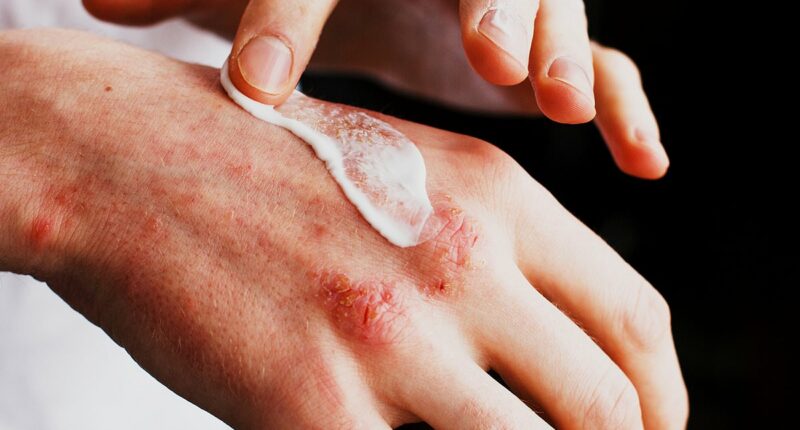Share this @internewscast.com
As temperatures drop, our hands can suffer a range of issues, from redness and rawness to dry, chapped skin. However, dermatologists assure us that with proper care, we can find relief from these uncomfortable conditions.
Experts highlight that the onset of cold weather and the use of central heating can weaken the skin’s protective barrier, causing cracked and painful hands for many people.
According to the British Association of Dermatologists, about one in 20 people in the UK experience hand dermatitis, also known as hand eczema, while one in ten adults are affected by broader eczema conditions.
Dermatologist Dr. Mazin Al-Khafaji shared with the Daily Mail that hands are frequently exposed to elements like ultraviolet rays and frequent washing, which can exacerbate skin issues.
Dr. Al-Khafaji emphasizes that one effective preventive measure is to enhance the skin barrier. This barrier acts as a protective seal for the skin’s outermost layer, the epidermis, helping retain moisture and fend off viruses, bacteria, and pollutants.
He further noted that “The palms lack sebaceous glands, and there are few on the tops of the hands,” which can contribute to dryness and irritation.
‘The function of these oil-producing glands is to keep the skin at its correct, slightly acidic pH level, hydrate and protect and strengthen that skin barrier.
But because of constant exposure to the elements, the hands are particularly prone to dryness and discolouration.’

The skin barrier keeps moisture locked in the skin
He adds that once the barrier is damaged, it can quickly become a recurring issue.
‘A lot of the conditions I see are because of the breakdown of the skin barrier. Once the skin barrier has been breached, it can become a recurring issue.
‘The initial damage becomes more injured by further contact with water, or UV light, or chemicals. The hands receive much more punishment than other parts of the body in that regard.’
Dr Al-Khafaji recommends protecting the hands with thick, natural moisturisers throughout the colder months.
‘The simplest thing is that you want to bolster that skin barrier so you should use thicker, natural butters, like shea butter or cocoa butter. You also want to look for hand creams which contain humectants, which absorb water to themselves, such as glycerine and urea,’ he said.
‘Because of the lack of sebaceous glands on the palms, ceramides are incredibly important, and the granular layer in the epidermis needs to be stimulated to produce more of them.’
Dr Al-Khafaji, regarded as one of the world’s leading Traditional Chinese Medicine experts, says this can even be supported with herbal remedies.
‘A combination of a herb called zi cao and Chinese angelica have been used forever in TCM to stimulate the production of these ceramides,’ he said.

Use thicker, natural hand creams, like shea butter or cocoa butter, during the winter.
Although our palms lack oil glands, they do have some extra protection against the elements and general wear and tear.
‘The palms and soles actually have an extra layer of the epidermis — normally the skin has four layers but these areas with thicker skin have five,’ he said. ‘The extra one is called the stratum lucidium, or the clear layer, which gives extra protection.’
In his London clinic, Dermatology M, Dr Al-Khafaji treats clients suffering from fissuring – where the skin thickens, dries out, cracks and sometimes bleeds – a telltale sign of fingertip eczema.
But for most people, dry hands are rarely a sign of anything more serious. ‘Mostly dry hands are just dry hands, so people need to look after themselves,’ he said.
‘With winter coming on, wear gloves if it’s cold, protect the skin barrier with humectants and creams – especially at night time – and be mindful of your hands’ exposure to sunlight, use SPF.’
Professor Carsten Flohr of the British Association of Dermatologists offered similar advice.

Winter has the potential to play havoc with our skin barrier
‘General advice includes, as well as moisturising, making sure to wrap up warm so the skin is protected from the elements that might cause it to dry out, and avoiding wearing harsher fabrics next to the skin.
‘To take it a step further, for people struggling with skin dryness, you may want to swap to a soap-free cleanser, or a soap substitute, especially for washing your hands or in the shower.
For people with a chronic skin condition that is susceptible to the cold, such as eczema or rosacea, it will be useful to get to know your triggers,’ he said.
For anyone unsure what’s making their skin flare up, Prof Flohr suggests keeping a diary to work out what causes dryness or itchiness.











